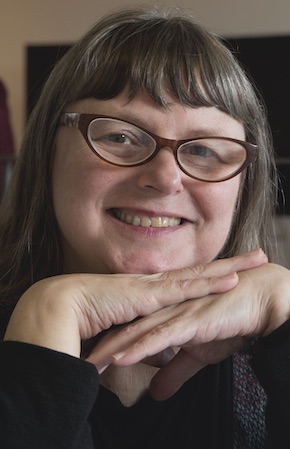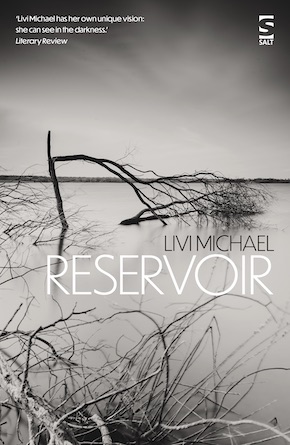Becoming a writer
by Livi MichaelMy twentieth novel, Reservoir, is a psychological thriller about memory, secrets and shame. My central character Hannah has reinvented herself in order to escape her past. Like me, she has moved from a working-class background into a profession that is traditionally middle class – in her case it is psychotherapy rather than writing.
At a recent event I was asked what made me want to become a writer. It’s a common enough question, but not always easy to answer. I didn’t come from the kind of background where people considered that possibility. I grew up on a council estate in Ashton-under-Lyne. After flunking my A levels, and having a baby, I did a Threshold course and went to university at 26.
Also at 26, I joined a writing group at Commonword in Manchester. Commonword was part of the Federation of Worker Writers and Community Publishers. The aim of this federation was to support working-class and community writing. I remember vividly the first time I went there. I was actually sweating with nerves. I almost changed my mind and went home. But that group, varied and diverse in membership and writing, was uniformly supportive, which was what I needed at the time. I remember leaving that first session feeling quite shaky with relief, not because I’d been hailed as the new Shakespeare, but because I’d found an audience that accepted my work. It undoubtedly helped me to find a voice.
Two of the women in this group were also writing novels. We went on to form a novel-writing group, (rather than one for general poetry and prose). That group ultimately led to my first novel being published. Under a Thin Moon was about the council estate where I grew up. It was rejected by several agents, but one of the women in the new group suggested I should send it to James Kelman’s agent, who was based in Scotland, and who might be interested in the work of northern working-class writers. So I did, and she was. In that same week it was accepted by two major publishers. I had to choose between them!
I was still at university. It was hard work, juggling motherhood, various part-time jobs and a forty-mile commute to university on unreliable transport, but I was enthralled by this new world of literature I would never otherwise have read. I could practically feel the doors of my mind opening. And the impact of all those different voices undoubtedly helped to shape my own writing style. Especially when I discovered the work of Scottish writer Lewis Grassic Gibbon, whose innovative narrative gave voice to a whole community. My PhD thesis considered his work in the context of other working-class writers from the 18th century onwards. It inspired me to use a different voice for my own novel, which I think helped me to secure a publishing deal.
Writers were mysterious to me; not really human, barely corporeal. I don’t think I’d even seen an author photo, and would have had a hard job imagining what one looked like.”
I went on to publish four novels for adults, then began a series of books for children, about my son’s hamster, Frank. This launched me on a different career track as a children’s writer, touring schools up and down the country. It was an interesting contrast to my own experience as a child reader. I had never met a writer. Writers were mysterious to me; not really human, barely corporeal. I don’t think I’d even seen an author photo, and would have had a hard job imagining what one looked like (although I do remember going down to London to meet my first editor for the first time and being overwhelmed by the feeling that I couldn’t go in, because I didn’t look like a writer!).
Yet I remember responding, at around the age of seven, to that regularly posed question, what do you want to be when you grow up? that I wanted to be a writer. I remember, in particular, being told that I would have to get a proper job (sadly, this was true). But where did I get the idea, at this early age, that I might metamorphose into one of these magical beings?
As a child I was passionate about reading. I read all kinds of books, but the ones I read over and over again fell into two categories. The first was fantasy, particularly the series by C.S. Lewis or Alan Garner, where children found portals from their ordinary, rather boring lives into magical worlds via caves or wardrobes (wardrobes have been a terrible disappointment to me ever since!). The second featured girls from unprivileged backgrounds who grew up to become writers: Little Women, Anne of Green Gables or the Little House on the Prairie series.
Anne of Green Gables in particular celebrated the imagination. Anne’s imagination occasionally got her in trouble, but it also helped her survive the orphanage, and her experience as an exploited child labourer.
I wasn’t a child labourer and I didn’t grow up in an orphanage, but like Anne my imagination sometimes got me into trouble. I was ‘always daydreaming’, my head was ‘in the clouds’, I was absent-minded and clumsy in the ‘real world’, which held few attractions for me at that time.
The idea that you could, from an unpromising start, become a writer, took root. These fictional girls carved out alternative identities for themselves by becoming writers, (even if they ultimately gave up in favour of marriage and motherhood).
These books were from America or Canada. At that time there was no English tradition of stories about working-class children who yearned to become writers. More recently Jacqueline Wilson’s Tracy Beaker series has filled that gap for many more children.
In Reservoir, Hannah is a psychotherapist with a specialist interest in neuroscience. Neuroscience tells us that what we think of as reality is just a narrative constructed by our brains. It would be interesting to know how fiction, and particularly children’s fiction, can affect that narrative.
It certainly changed mine.
—

Livi Michael has published seven previous novels for adults: Rebellion, Succession, Accession, Under a Thin Moon, which won the Arthur Welton award, Their Angel Reach, which won the Faber Prize, All the Dark Air, which was shortlisted for the Mind Award, and Inheritance, which won a Society of Authors Award. She has also written twelve books for children. She teaches creative writing at Manchester Metropolitan University and has been a senior lecturer in creative writing at Sheffield Hallam University. Reservoir is published in paperback by Salt.
Read more
livimichael.co.uk
@LiviMichael
@saltpublishing
Author photo by Paul Andrews


